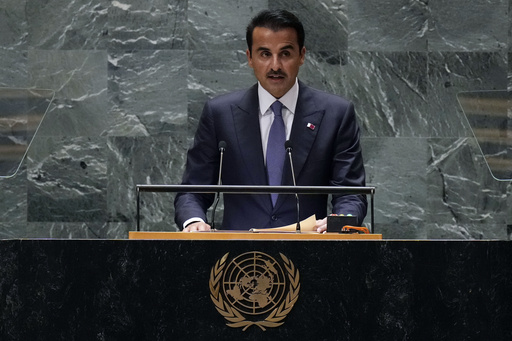
DUBAI, United Arab Emirates — The emir of Qatar announced on Tuesday that the nation plans to hold a referendum regarding the cessation of a brief foray into electing representatives for its advisory Shura Council.
Sheikh Tamim bin Hamad Al Thani did not specify when the referendum would take place during his annual speech before the Shura Council, which is primarily responsible for drafting laws, approving budgets, addressing significant matters, and advising the emir. However, it should be noted that this council lacks authority over crucial areas such as defense, security, and the economy.
This announcement signifies another retreat in the slow, hesitant journey of Gulf monarchies toward embracing a form of representative governance. This came after decades of U.S. advocacy for democratic reforms in the Middle East in the wake of the September 11 attacks and rising hopes for democracy following the 2011 Arab Spring uprisings.
From Qatar’s viewpoint, the earlier elections held in 2021 contributed to heightened tensions among different tribes and families just months following the resolution of a diplomatic standoff involving Qatar and four neighboring Arab nations.
Sheikh Tamim remarked, as quoted by state media, “We are all one family in Qatar,” before addressing the implications of candidate competitions for council membership. He noted that these contests often unfold among families and tribes, revealing differing perspectives on how such competition could affect cultural norms, traditions, and social institutions in the nation.
He further expressed concerns about the identity-driven nature of the competitions, suggesting that Qatar is not prepared to handle the potential complications that could arise over time from such rivalries.
Qatar’s electoral regulations differentiate between native-born and naturalized citizens, excluding the latter from participating in elections, which Human Rights Watch has characterized as “discriminatory.” This exclusion affects thousands of Qatari individuals, fueling minor protests from tribal groups, some of which resulted in arrests.
Plans for legislative elections were first introduced in Qatar’s 2003 constitution, but the government has delayed voting on multiple occasions. A breakthrough came in October 2021 when the country finally elected two-thirds of the Shura Council, shortly after a protracted boycott by Bahrain, Egypt, Saudi Arabia, and the United Arab Emirates ended.
This election also occurred just a year ahead of Qatar’s hosting of the 2022 FIFA World Cup, an event that garnered significant Western attention regarding labor rights and governance practices in the country. Despite these concerns, Qatar maintains a vital relationship with the West, having played a crucial role in geopolitical negotiations and crises, including hosting the Taliban and mediating in ongoing conflicts.
As with other Gulf states, Qatar operates under a hereditary leadership structure that maintains ultimate control over governance. Historically, rulers of the region relied on consensus among their citizens before the discovery of oil dramatically changed political dynamics.
The United States initiated a push for democratization in the Middle East after the Cold War, a drive that intensified under President George W. Bush following the 9/11 attacks, prompting Gulf states to implement cautious steps toward representation.
The U.S. State Department has yet to respond to inquiries regarding Qatar’s announcement, which is significant as the country hosts the Al-Udeid Air Base—the central command for U.S. military operations.
In his remarks, Sheikh Tamim emphasized that “the Shura Council is not a representative parliament in a democratic system.” He elaborated that in Qatar, there exists a direct relationship between the government and its citizens, supported by established communication channels between the two.
Qatar’s decision echoes trends seen in other Gulf nations; for instance, Kuwait’s ruling emir dissolved its parliament earlier this year, stalling any democratic representation in a body that offered the most significant degree of legislative freedom in the region.
Observing the drift away from democratic governance, Kristin Smith Diwan, a leading scholar at the Arab Gulf States Institute in Washington, noted, “We’ve seen this kind of retreat coming for some time.”
She underscored the evolving debate about representation and the prior popular demand for accountability, asserting that this moment of advocacy appears to have dissipated.
